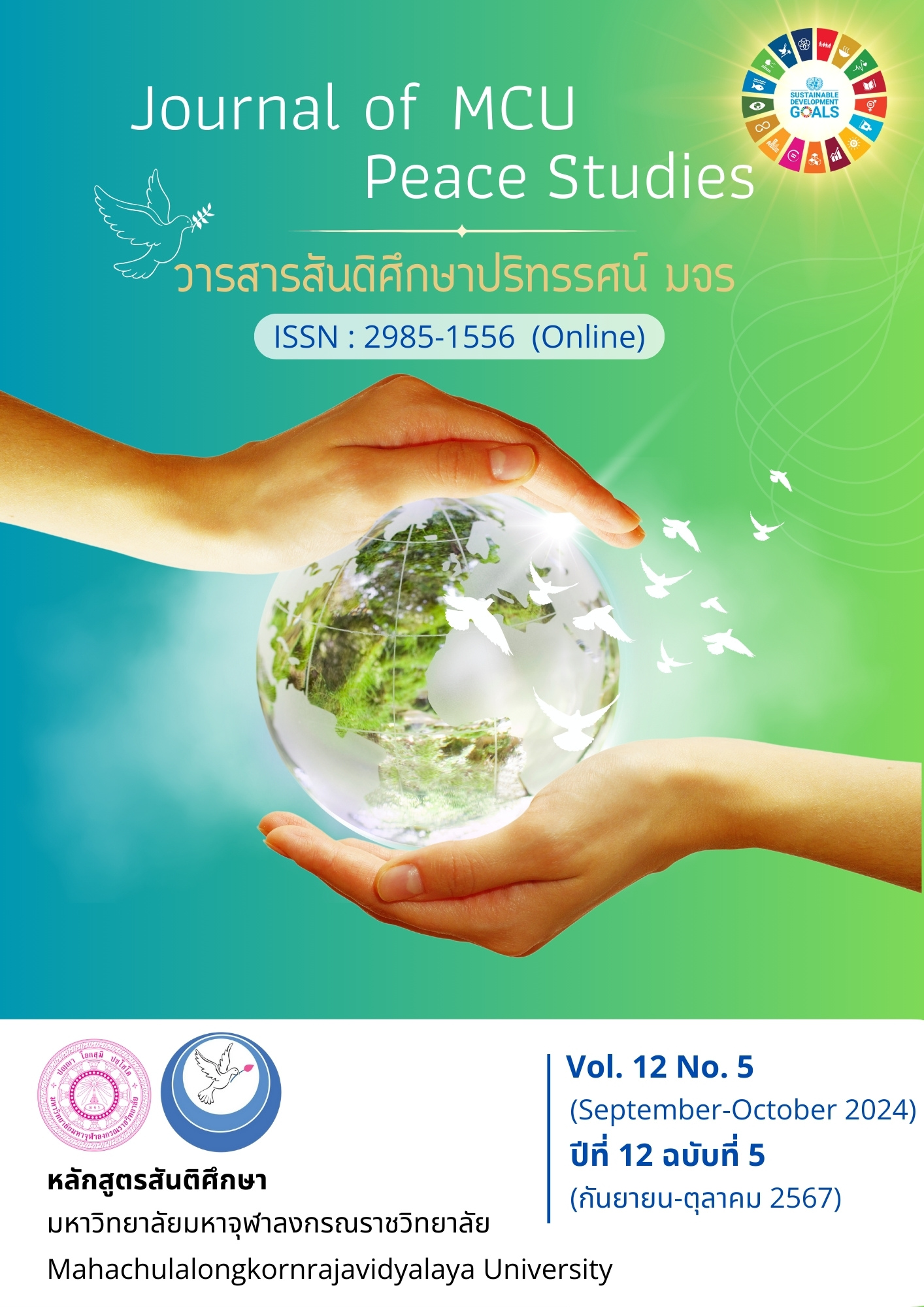รูปแบบการพัฒนาภาวะผู้นำการเรียนรู้ยุคใหม่ของผู้บริหารสถานศึกษา สังกัดสำนักงานเขตพื้นที่การศึกษามัธยมศึกษากาฬสินธุ์
Main Article Content
บทคัดย่อ
บทความวิจัยนี้มีวัตถุประสงค์เพื่อ 1) ศึกษาสภาพปัจจุบัน สภาพที่พึงประสงค์ และความต้องการจำเป็นในการพัฒนาภาวะผู้นำการเรียนรู้ยุคใหม่ของผู้บริหารสถานศึกษา กลุ่มผู้ให้ข้อมูล ได้แก่ ผู้ทรงคุณวุฒิ จำนวน 7 คน เลือกแบบเจาะจง กลุ่มตัวอย่าง ได้แก่ ผู้บริหารสถานศึกษา จำนวน 159 คน โดยการสุ่มแบบแบ่งชั้น และกลุ่มผู้ให้ข้อมูลในการศึกษาแนวทางการพัฒนารูปแบบ ได้แก่ ผู้ทรงคุณวุฒิ จำนวน 3 คน เลือกแบบเจาะจง 2) สร้างรูปแบบการพัฒนาภาวะผู้นำการเรียนรู้ยุคใหม่ของผู้บริหารสถานศึกษา สังกัดสำนักงานเขตพื้นที่การศึกษามัธยมศึกษากาฬสินธุ์ กลุ่มผู้ให้ข้อมูล ได้แก่ ผู้ทรงคุณวุฒิ จำนวน 7 คน เลือกแบบเจาะจง 3) ทดลองใช้รูปแบบ กลุ่มเป้าหมาย ได้แก่ ผู้บริหารสถานศึกษา จำนวน 15 คน โดยสมัครใจ 4) ประเมินรูปแบบฯ กลุ่มผู้ให้ข้อมูล ได้แก่ ผู้บริหารสถานศึกษา จำนวน 15 คน เลือกแบบเจาะจง เครื่องมือที่ใช้ ได้แก่ 1) แบบสอบถามความเหมาะสมองค์ประกอบ 2) แบบสอบถามสภาพปัจจุบัน และสภาพที่พึงประสงค์ 3) แบบสัมภาษณ์ 4) แบบบันทึกการสนทนากลุ่ม 5) แบบทดสอบ 6) แบบสอบถามพฤติกรรม 7) แบบสอบถามประสิทธิภาพ และ 8) แบบสอบถามความพึงพอใจ สถิติที่ใช้ได้แก่ ร้อยละ ค่าเฉลี่ย ส่วนเบี่ยงเบนมาตรฐาน และค่าความต้องการจำเป็น
ผลการวิจัย พบว่า 1) สภาพปัจจุบันอยู่ในระดับปานกลาง สภาพที่พึงประสงค์อยู่ในระดับมากที่สุด ลำดับความต้องการจำเป็นลำดับที่ 1 การกล้าคิดสร้างสรรค์ 2) รูปแบบฯ ประกอบด้วย 5 ส่วน ดังนี้ ส่วนที่ 1 หลักการและวัตถุประสงค์ของรูปแบบ ส่วนที่ 2 เนื้อหาของรูปแบบ ประกอบด้วย 1) การกล้าคิดสร้างสรรค์ 2) การใช้เทคโนโลยีและนวัตกรรมการเรียนรู้ยุคใหม่ 3) การเปลี่ยนแปลงที่เหมาะสมกับบริบทยุคใหม่ ส่วนที่ 3 กระบวนการพัฒนา ส่วนที่ 4 การประเมินผล และส่วนที่ 5 เงื่อนไขความสำเร็จ มีความเหมาะสมและความเป็นไปได้อยู่ในระดับมากที่สุด 3) คะแนนประเมินความรู้หลังการเข้าร่วมพัฒนา สูงกว่าคะแนนประเมินความรู้ก่อนการเข้าร่วมพัฒนา ระดับพฤติกรรมหลังการพัฒนาสูงกว่าก่อนการพัฒนา 4) ด้านความเป็นประโยชน์รูปแบบ อยู่ในระดับมากที่สุด และระดับความพึงพอใจอยู่ในระดับมากที่สุด
Article Details

อนุญาตภายใต้เงื่อนไข Creative Commons Attribution-NonCommercial-NoDerivatives 4.0 International License.
ทัศนะและความคิดเห็นที่ปรากฏในบทความในวารสาร ถือเป็นความรับผิดชอบของผู้เขียนบทความนั้น และไม่ถือเป็นทัศนะและความรับผิดชอบของกองบรรณาธิการ ยินยอมว่าบทความเป็นลิขสิทธิ์ของวารสาร
เอกสารอ้างอิง
Ampai, T. (2021). Development of Internal Supervision Model to Raise the Quality of Education in Small Schools under the Office of the Basic Education Commission. (Doctoral Dissertation). Maha Sarakham University. Maha Sarakham.
Asavapoom, S. (2007). Using Research to Develop Models in Doctoral Theses. Journal of Ubon Ratchathani Rajabhat University, 2(2), 76-85.
Bowonchaidet, R. (2017). Development of a Program to Strengthen Effective Leadership of School Administrators under the Provincial Administrative Organization. (Doctoral Dissertation). Maha Sarakham University. Maha Sarakham.
Chaemchoi, S. (2018). Educational Institution Administration in the Digital Age. Bangkok: Chulalongkorn University Press.
Charoenchai, W. (2019). Development of a High-Performance Organization Management Model to Develop the Quality of Education in Educational Institutions under the Provincial Administrative Organization. (Doctoral Dissertation). Maha Sarakham University. Maha Sarakham.
Crawford, J. (2004). Educating English Learners: Language Diversity in the Classroom. (5th ed.). Los Angeles: Bilingual Education Services.
Crompton, H. (2018). Education Reimagined: Leading Systemwide Change with the ISTE Standards. USA: International Society for Technology in Education.
Deming, E. W. (1995). Out of the Crisis. USA: The Massachusetts Institue of Technology, Center for Advanced Engineering Study.
Elliott, T. (2017). Digital Leadership: A Six-Step Framework for Transformation. Retrieved November 27, 2023, from https://1th.me/ZQPLH
Haseesuk, S. (2022). Teaching and Learning Management Model Based on the Concept of Understanding, Access and Development of Ban Muang Kae School under the Buriram Primary Educational Service Area Office, Area 4. Journal of Social Innovation and Mass Communication Technology, 5(2), 1-10.
Krejcie, R. V., & Morgan, D. W. (1970). Determining Sample Size for Research Activities. Educational and Psychological Measurement, 30(3), 607-610.
Leenalad, P., Phabutra, C., Suwantrai, W., & Duangchatham, S. (2017). Effective Leadership Development Model of Administrators of International Standard Schools in the Northeastern Region. Journal of Educational Administration Khon Kaen University, 13(1), 11-20.
Misdee, P. (2019). Development of a Program to Strengthen Transformational Leadership of First-Level Executives Rajabhat University. (Doctoral Dissertation). Maha Sarakham University. Maha Sarakham.
Pakotang, J. (2018). Leadership in the Digital Age for Professional School Administrators. Ubon Ratchathani: Faculty of Education, Ubon Ratchathani Rajabhat University.
Phapabutr, C., Duangchathom, S., & Hansuri, S. (2020). Technological Leadership Development Model of School Administrators in the Digital Era. Journal of Educational Administration and Leadership Sakhon Nakhon Rajabhat University, 9(33), 1-11.
Robbins, S. P. (2001). Organizational Behavior. (9th ed.). Upper Saddle River, NJ: Prentice-Hall.
Runcharoen, T. (2014). Professionalism in Organizing and Administering Education in the Era of Educational Reform for Reform Round 2 and External Evaluation Round 3. (8th Printing). Bangkok: Khao Fang.
Sairam, B. (2016). Development of a Program to Enhance Leadership Skills in Team Building for School Administrators. (Doctoral Dissertation). Maha Sarakham University. Maha Sarakham.
Secondary Educational Service Area Office Kalasin. (2022). Action Plan for Fiscal Year 2022. Kalasin: Secondary Educational Service Area Office Kalasin.
Sheninger, E. (2014). Digital Leadership Changing Paradigms for Changing Times. Thousand Oaks, CA: Corwin Press.
Sinlarat, P. (2011). A New Educational Framework. Bangkok: Chulalongkorn University Press.
Somprat, K. (2017). Learning Leadership of Administrators of Basic Educational Institutions: A Study of Foundational Theory. Journal Academic and Research Faculty of Education Social Science Khon Kaen University, 12(34), 51-65.
Srisa-at, B. (2017). Preliminary Research. (10th ed.). Bangkok: Suviriyasan.
Swanson, R. A., & Holton, E. F (2001). Foundations of Human Resource Development. San Franciso: Berrett-Koehler.
Thammatasananon, S. (2019). Model for Developing Creative Leadership of Administrators of Basic Educational Institutions. Journal of Educational Research, 14 (2), 149-162.
Wansri, J. (2021). Educational Management in the Digital Age. Phitsanulok: Rattanasuwan Printing 3.
Yossomsak, S. (2006). Human Resource Management: Principles and Concepts. Bangkok: A.T. Press.


